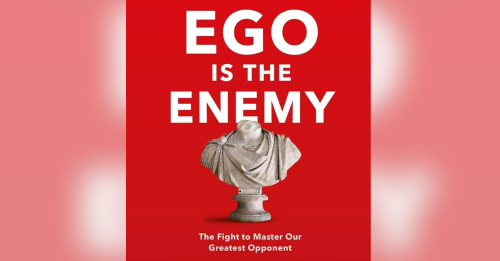4 Stoic Strategies to Help Master Ego - Insights from Ryan Holiday

By The Mindful Leader Team
Introduction
In "Ego is the Enemy," Ryan Holiday masterfully explores the management of ego, blending Stoic wisdom with captivating historical anecdotes and key psychological principles. He argues that effective leadership is deeply rooted in the understanding and management of one’s ego. His insights are crucial for leaders seeking to navigate the complexities of ego, harmonizing the rational detachment of Stoicism with the mindful awareness at the heart of Mindfulness.
Mindfulness and Stoicism, though different in their approaches, share a commitment to enhancing self-understanding and perception of the world. Mindfulness, grounded in Buddhist traditions, encourages being fully present and maintaining an open, non-judgmental awareness of thoughts and surroundings. In contrast, Stoicism, born in ancient Greece and Rome, values rationality and virtue, emphasizing the importance of recognizing and accepting what lies within our control.
In this article, we'll delve into four practical strategies revealed by Holiday. These strategies are not only insightful but also actionable, offering readers effective ways to apply these principles in their leadership development. So, let’s embark on this journey with Ryan Holiday, discovering how to skillfully apply these strategies to harness the power of ego for personal and professional growth.
1. The Lifelong Learning of Effective Leaders
Holiday underscores the importance of continuous learning for leaders, using the example of Marcus Aurelius. Despite being a Roman Emperor, Aurelius devoted himself to Stoic studies, writing meditations that reflected his commitment to personal growth and philosophical inquiry. This approach challenges the notion of leadership as a static achievement and warns against the complacency that can come with success.
Further illustrating this point, Holiday recounts the story of John Boyd, a brilliant military strategist known for his concept of the OODA loop. Boyd's relentless pursuit of knowledge and willingness to question his theories epitomized the idea that true leaders never stop being students. This story is a stark reminder of the Dunning-Kruger effect, where leaders might overestimate their understanding and abilities, a direct consequence of unchecked ego.
Practical Tip: Dedicate time each week to learn something new related to your field. This could be through reading articles, attending webinars, or engaging in discussions with peers. Acknowledge that regardless of your experience, there's always room for growth.
2. Integrity and Self-Reflection in Leadership
Through Seneca's teachings, Holiday explores the necessity for leaders to reflect and align their actions with core values. He contrasts the trajectories of two striking figures: Howard Hughes and Katharine Graham. Hughes, initially a successful businessman and aviator, allowed his ego to drive decisions that ultimately led to his downfall. In contrast, Katharine Graham, the publisher of The Washington Post, demonstrated how aligning leadership with core values led to profound success and respect. Her story emphasizes the psychological concept of cognitive dissonance, where inconsistency between beliefs and actions can lead to internal conflict.
Practical Tip: Regularly reflect on your decisions and actions to ensure they align with your core values. Create a personal mission statement and revisit it during decision-making processes to maintain integrity in your leadership.
3. Embracing Feedback for Growth
Holiday highlights the Stoic principle of learning from every situation and person, as championed by Epictetus. This principle is vital in overcoming confirmation bias, where leaders might seek only information that supports their pre-existing views.
The transformation of Katharine Graham’s leadership style, particularly during the Pentagon Papers saga, is a testament to the power of feedback. Her willingness to listen to her editors and reporters, often challenging her preconceptions, was crucial in The Washington Post's pivotal role in this historical event. Holiday uses Graham's story to illustrate how leaders can grow and make better decisions by embracing diverse perspectives.
Practical Tip: Actively seek feedback from your team and peers. When receiving feedback, listen actively without immediately defending your position. Use this information as a tool for self-improvement and decision-making.
4. Humility as a Leadership Virtue
The book delves into the Stoic virtue of humility through the life of Cato the Younger, a Roman statesman known for his principled stand against corruption. Cato's humility, despite his high social standing, is a lesson for modern leaders on the importance of staying grounded.
Holiday also references Angela Merkel, the Chancellor of Germany, known for her understated and effective leadership style. Her approach demonstrates the psychological concept of the hedonic treadmill and how constant achievement without humility can lead to a lack of fulfillment.
Practical Tip: Show appreciation for your team's efforts and share successes with them. Remain open to learning from others, regardless of their position. Practice mindfulness to stay grounded in the present moment, appreciating the journey rather than just the achievements.
Final Thoughts
In "Ego is the Enemy," Ryan Holiday presents a compelling narrative that challenges traditional views of leadership. By weaving together historical anecdotes, Stoic philosophy, and psychological insights, he provides a roadmap for leaders to manage their ego effectively. This journey involves continuous learning, integrity, openness to feedback, and humility. These lessons are not just theoretical but are rooted in real-life examples of leaders who navigated the complexities of ego to achieve lasting impact and fulfillment. Holiday's book serves as a reminder that the path to effective leadership is often less about asserting one's ego and more about understanding and managing it, fostering a leadership style that is both wise and grounded in reality.
Learn more with this video.

1 comment
This method questions the idea of leadership tiny fishing as a fixed accomplishment and cautions against the satisfaction that can accompany success.
Leave a comment